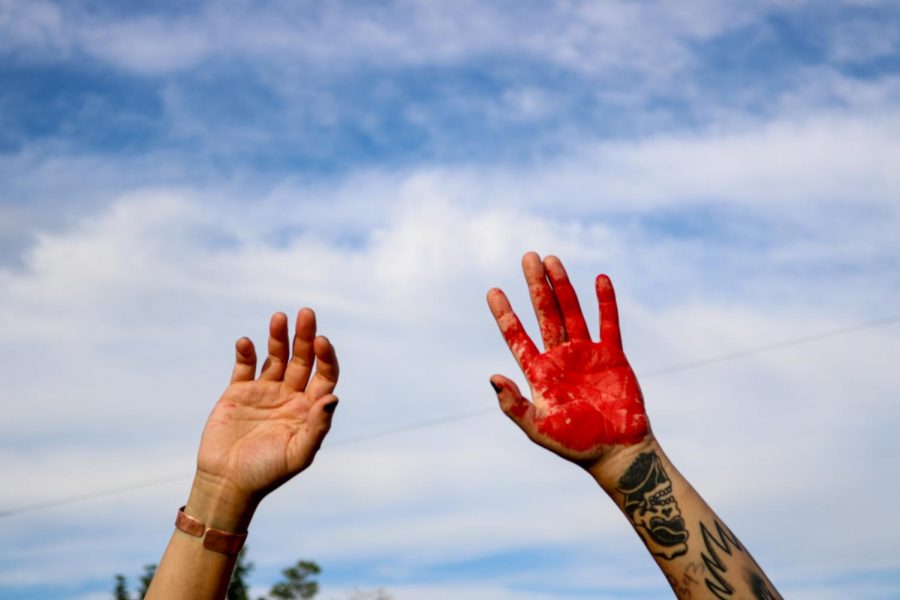Barron: Worry About Black Lives, Not Respecting Officers
Protesters paint the streets red, to illustrates all the blood that has been spilled by the police at the District Attorney’s Office in Salt Lake City on June 27, 2020. (Photo by Ivana Martinez | Daily Utah Chronicle)
July 3, 2020
In a Senate floor speech, Utah Senator Mike Lee spoke of a peaceful protest organized in Ogden after George Floyd’s murder. Quoting Malik Dayo, a local activist and organizer, Lee identified this protest as a solidarity rally, not an anti-cop rally, that honored Nate Lyday, a fallen Ogden police officer, alongside Floyd. Before yielding the floor, Lee proclaimed, “It will only be in standing — and working — together, in peaceful solidarity, that we can finally heal the wounds in our nation.” However, not once during his almost six-minute speech did Lee mention what Ogden protestors gathered to support — police accountability and department transparency. Lee may have planned for his speech to read as support for reform, but his fixation on honoring police officers revealed his words were only focused placations. The legislation will continue to fall short of addressing police brutality and racial injustice if lawmakers focus on revering officers instead of protecting Black Americans.
Protests over the past month have shifted public opinion on racial injustice and police brutality. Perhaps threatened by increasing support for police reform, New York police union president Michael O’Meara declared that he refused to be ashamed of his profession, “I am not Derek Chauvin.” He claimed the Chauvin’s actions in Minneapolis have no effect on New York police officers’ integrity while failing to mention police instigated violence against protestors occurring in the state from New York City to Buffalo.
O’Meara’s speech was simple, but effective political theater meant to perpetuate the myth that holding officers accountable for their actions is disrespectful. This narrative has led to Senate Republicans proposing a reform bill that does nothing to promote police accountability to protect Black Americans. Indeed, instead of banning chokeholds and no-knock warrants, this bill only discourages their use. Additionally, the reforms included in the bill, requiring officers to wear body cams and providing access to de-escalation training, have already been proven ineffective against curbing police brutality. The bill also fails to address qualified immunity, the legal protection for police officers that forecloses victims’ ability to sue, which activists have identified as one of the biggest problems with our current policing system.
Qualified immunity is intended to balance “the need to hold government officials accountable when they exercise power irresponsibly and the need to shield officials from harassment, distraction, and liability when they perform their duties reasonably,” but research suggests this doctrine is often applied too broadly. While pro-police advocates argue adjusting qualified immunity would prevent police officers from doing their job, there is evidence that opening officers up to civil liability would not impact their ability to serve communities, nor will it deter police applicants. If qualified immunity was revoked or limited, police officers who abuse their authority would more than likely be held to account.
As the Supreme Court recently declined to hear any cases pending before it on qualified immunity, adjusting this doctrine to increase police accountability is up to Congress. The Democrat-backed Justice in Policing Act, which would eliminate qualified immunity for law enforcement, has already passed in the House but is expected to stall in the Senate. To support this legislation, student allies should email their Senators to demand they vote to protect Black Americans by increasing police accountability. Additionally, students should not share “copaganda” and perpetuate the narrative that holding police officers accountable for excessive or unlawful actions is disrespectful.
Even as protests across the nation sparked discussions of police reform, police groups began waging a campaign against meaningful change. Afraid of appearing “soft on crime” or disrespectful of police sacrifices, only a single Senate Republican has come out in support of addressing qualified immunity. Student allies have a responsibility to prevent the spread of the police victim narrative and to ensure their Senate representatives know that Black lives matter more than perceived respect for police officers.








